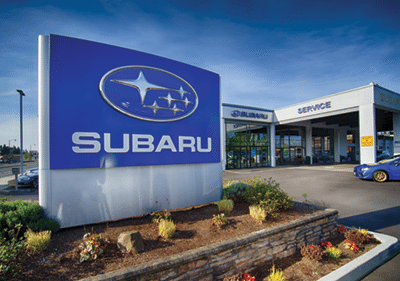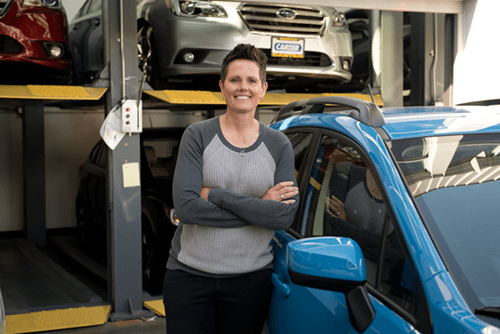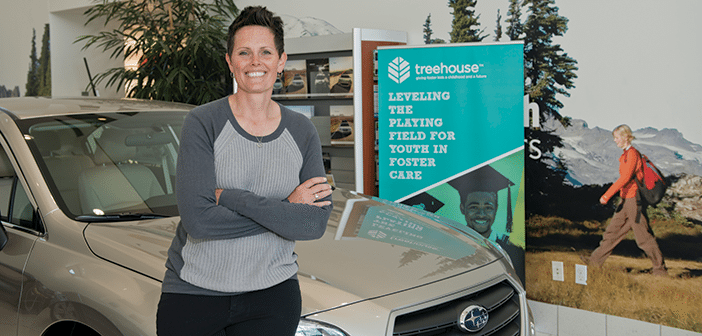Dealer Fights Customer Flight With Prices and Value
By Mary Welch
Need a four-wheel alignment or cabin air filter replacement but am not sure the dealership will give you the best price? Don’t worry. At Carter Subaru Ballard in Seattle, Wash., their prices as well as their competitors’ are on its website.
Sometimes they are cheaper. For instance a synthetic oil and filter change costs $69.95 using genuine Subaru OEM parts at Ballard versus $84.95 at Jiffy Lube using non-factory aftermarket parts. Sometimes it’s a bit pricier. A battery replacement costs $137.35 versus $125 at the same Jiffy Lube or even $129.99 at Firestone.
 “Our biggest challenge in today’s climate is competing against the independents. It’s trying to convince our customers that our value is greater even if our prices are the same,” says Jennifer Moran, executive manager of Ballard. “The perception that you fight is that people could get better service elsewhere, and for less. We don’t ever view our competitors in the same brand as our competition; it’s always the independents.”
“Our biggest challenge in today’s climate is competing against the independents. It’s trying to convince our customers that our value is greater even if our prices are the same,” says Jennifer Moran, executive manager of Ballard. “The perception that you fight is that people could get better service elsewhere, and for less. We don’t ever view our competitors in the same brand as our competition; it’s always the independents.”
Moran, who has been at Carter Motors since 2007, says price perception is hard to overcome. “How do we convince our customers that the dealership that they purchased the car from is the right place to get service than over at an independent? And know you’re not going to pay any more with us than elsewhere? It’s a hard thing to overcome even if they had a great sales experience.”
Kristina Kelley, service manager at Carter Subaru Shoreline, says one way is to do the price comparisons for their customers. “We decided to be completely transparent. We have nothing to hide. I don’t look at our competitors’ websites and say we’ll do this job for $4 less. But I do see that they wait for me to put something on our website and will try to match or be less.”
Kelley points out that it’s not about being cheaper. “We could be at any price, but if you’re not providing value, who cares? You’re willing to pay a price for the service that’s behind it. From my perspective our number one job isn’t just selling cars; it’s to build a service-based company. Why are you going to buy a nice car and then spend $14.99 for the cheapest oil?”
She admits that their website comparisons are not the industry norm. Not only do they run comparison pricing but they offer parts and service specials and coupons. They also run entertaining videos on common maintenance items and operations such as brake repair pods and rotors, battery replacement and checking engine air filters. For those who don’t understand about proper maintenance of such items as windshield wipers, shocks and struts and brakes, there are easy-to-understand that explanations that should be the extra impetus needed for a customer to make a service appointment.
“We aren’t an anomaly. But again, we tell our customers our goal is a fair price, not the cheapest. We’re also not afraid to answer questions about cost from people on our website,” Kelley says. “People are looking for prices and services on websites and they should. I do everything on my iPhone and I assume everyone else is as well.”
The women say they’ve taken this aggressive, transparent stance for about two years now especially when they realized that dealers are selling parts to the independents at wholesale prices. “Who’s winning here,” Moran recalls asking. “And, it wasn’t us.”
Every since the recession ended, the service business has increased year over year. They acknowledge that part of it is the Carter brand, which has been a fixture in the community since the 1960s. Wade Carter III opened his first dealership, a Volkswdagen in Seattle in 1960 and Carter Subaru in Shoreline in 1976. In 2009, Carter Subaru in Ballard opened its doors. Wade Carter III passed away in 2001 in a helicopter accident and his son, Wade Carter IV and daughter, Sara, took over ownership. Overall there are 220 employees (full and part-time) and there are 27 service bays in Ballard.
“If I were really being honest and giving one answer about why we’re so successful, I would say it’s the Carter reputation,” says Moran. “They’ve been here for an awfully long time and have been paying it forward in our community for a long time. We give and our customers give it back to us. Sure, it helps the business getting our name out, but it’s really the right thing to do.”
Kelley has worked at Carter for 5 years, and says she’s never seen anything like the customer loyalty the dealership gets. “It’s family owned and people know the family. They know we support a lot of things — women’s professional basketball, the zoo, and a lot of environmental issues. We plant a tree for every test drive and three additional ones with a purchase.”
Also helping the dealership is the increased popularity of Subaru. “We’re selling more cars,” says Moran. “Subaru has always been popular in the Northeast and in the Northwest, but in other parts of the country, particularly the Sunbelt states, they’re suddenly selling and there’s an increase in sales and market penetration. For a long time no one outside the Northeast and Northwest was interested in a Subaru.”
Jennifer admits that she knows that a relationship with the service department should start the day a vehicle is purchased. “I kno

Regardless of whether its web presence, the reputation, the increased interest in the brand or its price transparency, it’s working. About 50 percent of those who purchased vehicles at the Shoreline location return to get them serviced there. “Our corporate goal is even higher,” Kelley says.
Let’s face it, Moran says, “Cars are better made than ever before. They’re not breaking down like they used to, which is good. They don’t need maintenance as frequently as even five years ago, so we have to be better than everyone else, and provide unprecedented customer service, or we will not retain that customer.”








